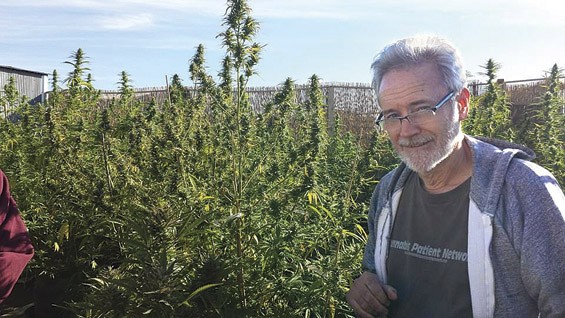
January 21 found Raines standing behind Christine Bay and her three-year-old daughter at a hearing inside the Kansas State Capitol. The young, red haired girl in Bay's arms suffers debilitating seizures that often lead to trips to hospitals and urgent-care clinics.
"Her pediatrician wants her to have the opportunity to try cannabis oil," Bay told senators considering a medical marijuana bill for the Sunflower State. "I ask that you allow our doctors to do their job and preserve the lives of these children and patients."
Standing next to Raines on the hearing-room floor was Mark Pedersen, a fellow marijuana advocate who a few years back founded the pro-pot group Sensible Missouri — an organization that today has a brand new leader in Raines.
Like Pedersen, Raines is a firm believer in the medical promise of marijuana. He remembers witnessing the drug's potential a few years ago when his long-ailing stepmother was on her death bed, drained and weakened after a long struggle with cancer. Raines was a casual toker back then (he says he no longer uses marijuana because of his job) and rolled a joint for his dying mom. Ten minutes later she came bursting through bedroom door on her feet — something Raines and his sister hadn't seen for months.
"Our heads like shot around, absolutely shocked," Raines recalls. "And my step mom was like, 'Fuck you Nicholas, I'm hungry.'"
He still chuckles at the memory. "She proceeded to make the biggest breakfast for all of us. She lasted seven or eight months longer and had a quality of life that she never would have had without cannabis."
Pedersen, who authored Kansas City NORML's controversial ballot initiative, has a somewhat similar tale. A Missouri native now living in Colorado, he says pot treated the fibromyalgia that struck him after years spent breathing the polluted air of his hometown of Herculaneum and its notorious lead smelter. Now he spends his days producing cannabis oil for terminal patients and giving presentations about the wondrous healing properties of weed.
"I made a promise many years ago to the patients of Missouri that I would write the first full legalization bill, and I attempted to do that in 2012," says Pedersen, who has also run afoul of Show-Me Cannabis.
Indeed, Pedersen once served on Show-Me Cannabis' board and in 2012 wrote up the group's original ballot initiative to legalize marijuana in Missouri. But where Pedersen proposed few restrictions in his draft bill, other members of the group eventually added restraints such as an age limit and DUI provision.

Shortly afterward, Show-Me Cannabis booted Pedersen out of the organization. Members worried that his personal pot garden could bring the group unwanted attention if word of it leaked out. According to Thampy, Pedersen's lack of medical credentials also worried donors who wanted a spokesperson with doctoral authority, not some guy cranking out cannabis oil who believes weed is harmless as a tomato and cures cancer.
But to pot advocates like Raines and Pedersen, the politicized, message-conscious Show-Me Cannabis is the blind party here.
"Missouri doesn't need baby steps," Raines insists. "This a reckoning for all these years, all the Americans that were lied to about the healing qualities of cannabis."
For Stroup, the divide between Raines and the establishment feels familiar. Forty years ago Stroup was the outside radical applying pressure against the establishment, and he initially chose the NORML acronym to stand for "The National Organization for the Repeal of Marijuana Laws." Stroup says he had to be convinced to change it to "Reform" so he could reach a broader base of supporters. Like Show-Me Cannabis, NORML advocates using the tax-and-regulate model currently enforced on the alcohol industry, while adding provisions as needed to address issues such as medical marijuana, expunging criminal records and setting limits on the number of plants individuals may own.
"Most of us have found that you only make progress through incremental changes, but I think you're always going to have people who are trying to push the envelope. I think that's obviously a good thing," says Stroup. "If they want to do it, without using the NORML name, I'm all for it. Frankly I think it makes [Show-Me Cannabis'] petition look far more moderate, and it may actually help it."
There may be something to Stoup's last point. Nushin Rashidian, a journalist who co-wrote A New Leaf: The End of Cannabis Prohibition, explains that splinter groups like Kansas City NORML cropped up during the legalization pushes in Washington, Oregon and Colorado. But the endgame is always the same.
"It created headaches for the campaigns that were trying to do it right, but I don't think these more lax or more fringe legalization efforts really ever pose a danger," says Rashidian. "It's always a group of very riled up activists, and eventually they kind of run themselves into the ground."
Yet as Raines has already proven in his post-NORML return, he's not going anywhere soon. Moreover, he believes it's his ballot initiative calling for the unrestricted legalization of marijuana that Missourians will ultimately favor at the polls.
"For them to say Missouri is not ready is absolutely not true," he says of Show-Me Cannabis' objection to his ballot initiative. "That's what they want you to believe because they don't want any competition, they don't want any choices."
Meanwhile, Thampy and others at Show-Me Cannabis shake their heads. To them, Raines and his initiative remains pure fantasy — the kind better suited for a dorm room bong circle than hallways of the Capitol.
"What they want is more than to just legalize marijuana, they want to totally create a new social and government system," he says, sounding exasperated. "We've done outreach, we've done media, we're in the political discussion, we have lobbyists, we have staff members. We have built the organization that is capable of victory, and it's kind of bizarre being in this conversation with people who don't understand any of that."





